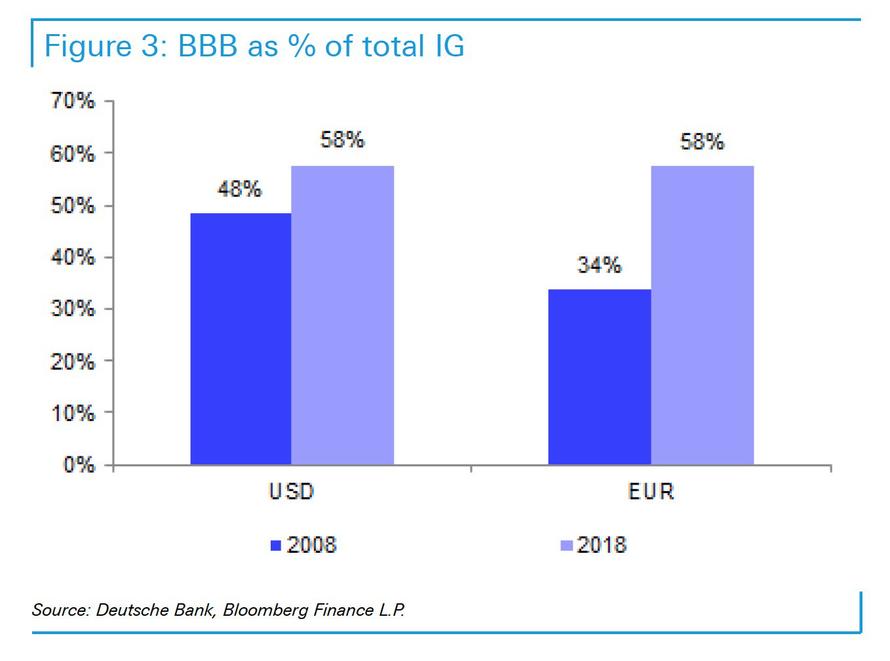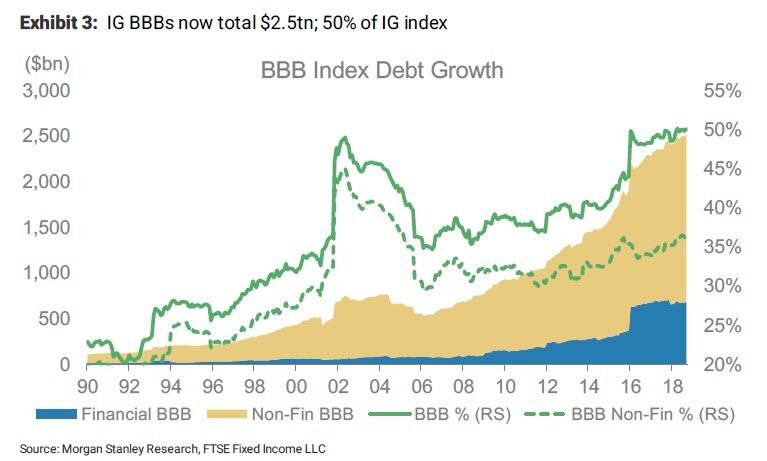via Zerohedge:
Over the past year, one of the key concerns to emerge in the $6.4 trillion investment grade corporate bond market is when and how will BBB-rated bonds, which now comprise 60% of all outstanding IG names in the US, be downgraded and whether a new financial crisis will follow
We addressed this issue most recently in “The $6.4 Trillion Question: How Many BBB Bonds Are About To Be Downgraded” while the broader question of the “next bond crisis” was address in “Over $1 Trillion In Bonds Risk Cut To Junk Once Cycle Turns.” It wasn’t just us, however, with financial luminaries, regulators and investors such as the Fed, the BOE, the IMF, Oaktree’s Howard Marks, Doubleline’s Jeff Gundlach, JPMorgan, and Guggenheim all warning that the “fallen angel” threat is arguably the most serious challenge facing the US corporate bond market during the next recession.
And now, it’s the turn of the central banks’ central bank, the Bank of International Settlements, to join the bandwagon, warning that the surging supply of corporate debt in the riskiest, BBB investment-grade category has left markets vulnerable to a crash once economic weakness triggers a bout of rating downgrades, and sends over $1 trillion in IG bonds, or fallen angels, right into junk bond purgatory.
Highlighting numbers which have been discussed previously, the BIS notes that in 2018, BBB-rated bonds accounted for about 45% of U.S. and European mutual fund portfolios, up from only 20% in 2010, according to the BIS, and cautions that due to rating trigger limitations, many investors may have to sell those bonds if they fall out of the investment-grade scale.
And, once an economic downturn prompts credit-rating cuts, this could trigger a market crash as investors dump newly ineligible debt from their portfolios, according to the BIS, precisely what we warned about last October warning that over $1 trillion in bonds could be downgraded during the next downturn, effectively doubling the size of the entire US junk bond market.
The BIS’ warning boils down to this: a wave of downgrade would result in a liquidation firesale as all those who held on to hundreds of billions in IG debt are suddenly forced to liquidate, potentially resulting in a bidless market:
“If, on the heels of economic weakness, enough issuers were abruptly downgraded from BBB to junk status, mutual funds and, more broadly, other market participants with investment grade mandates could be forced to offload large amounts of bonds quickly,” wrote analysts at the the Basel-based institution in a quarterly report.
“While attractive to investors that seek a targeted risk exposure, rating-based investment mandates can lead to fire sales.”
This isn’t the first time the BIS has cautioned about the risk of a firesale: BIS previously warned about excesses in lending to leveraged companies. Still, the premium for holding risky corporate debt has narrowed in 2019 with an “exceptionally strong” performance entirely erasing a selloff in European credit in the fourth quarter of 2018, according to JPMorgan Chase & Co.
Ironically, while much of the financial press was obsessing over the risk of “fallen angels” in late 2018 – about a year after we first highlighted said risk – as bond prices were tumbling, and threatened to create a self-fulfilling prophecy of lower prices, translating into ratings downgrades, and thus, even lower prices, ever since the late December dovish reversal by the Fed, the BBB space has been one of the best performing subsectors in the broader corporate bond market.
In fact, as Bank of America noted last week, when it highlighted Verizon’s comments from a securities analyst meeting in New York noting that this company, the third largest BBB-rated name in our index, is clearly aware that its footprint in the debt world is so large they are forced to be super focused on deleveraging, should Verizon follow through with their plans that could lead to positive ratings outlooks, which would make the company a candidate to return to the A-rated bucket.
That means that contrary to the BIS’ warning, rising angel risk is suddenly more relevant than the fallen angel risk markets – and now the BIS – are so focused on. This, as BofA admitted, is one reason the bank prefer BBBs – especially large ones.
It’s not just Verizon: as BofA noted, the recent struggles for Kraft Heinz – the 20th largest BBB issuers – demonstrate that IG ratings matter for this BBB rated name as they rely on acquisitions to buy growth, and thus need access to the IG primary market. Whether they ultimately are able to successfully defend their IG rating is anyone’s guess, but the 36% dividend cut implies a meaningful transfer of value from shareholders to bond holders. Hence, while the stock tanked 27% two weeks ago, credit spreads actually widened just a modest 13bps.
This means that instead of “fallen angel” risk, the biggest BBB names in the US are actually subject to “Rising angel” risk, i.e., the possibility of being upgraded to the A bucket as companies – worried about their balance sheet prospects – start to aggressively pursue debt deleveraging. The full list of the biggest BBB names is shown below.
Of course, once the current “everyone loves bonds” euphoria passes, and investors once again turn their focus on fundamentals, the party will be over, and the wholesale selling of BBBs will resume because whether in 2020 or later, a recession is coming, and the companies that will be most impacted will be the names in the list above. The only question is when will the market again start discounting that.



